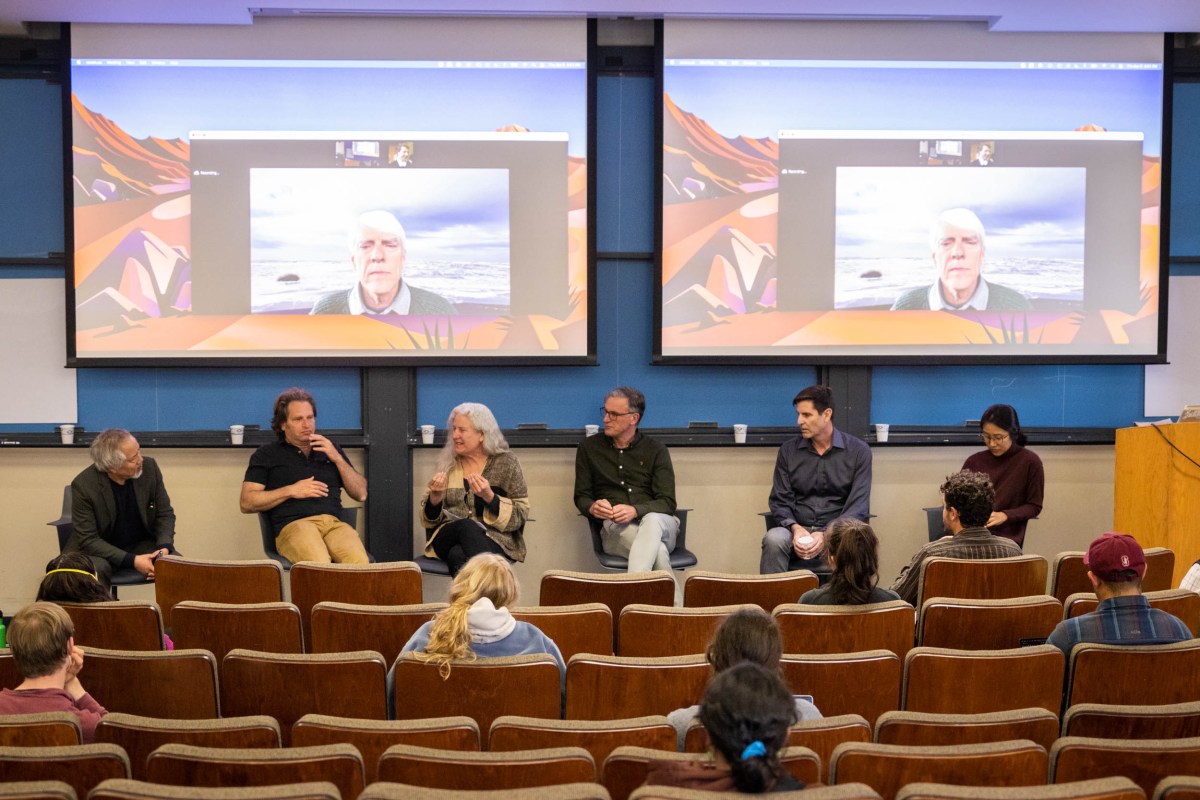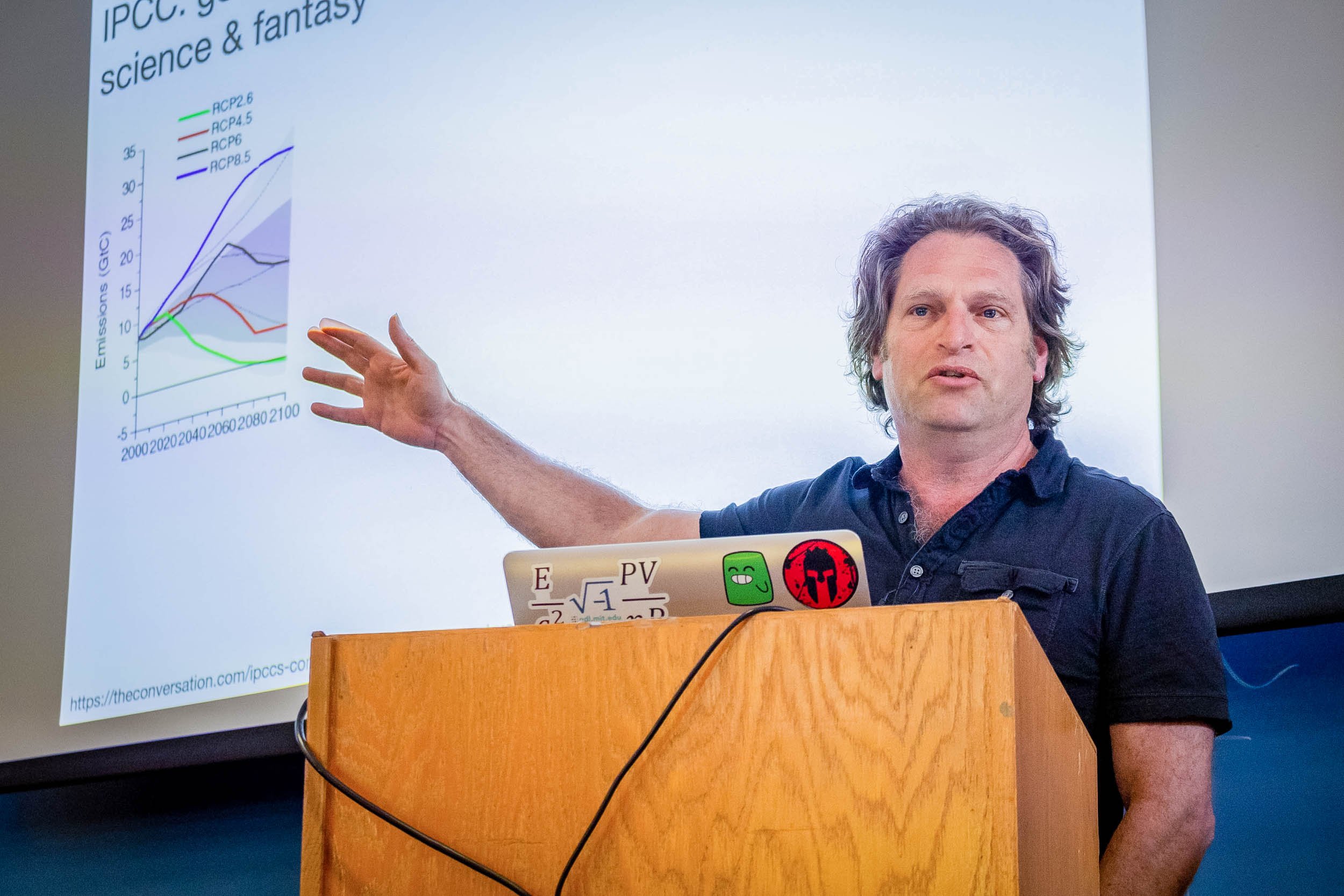Adam Aron, a psychology professor at the University of California, San Diego (UCSD), studied neuroscience for nearly 20 years. But then, his research interests shifted as he witnessed climate change getting worse. Now, he studies the psychology of climate action and mobilizes students, professors and more to fight against the climate crisis.
He recounted his transition to an audience of approximately 40 people at the Braun Geology Corner on Thursday afternoon. Throughout his talk, Aron had one major piece of advice for his audience: “find your frontlines.”
Aron described frontlines as places where individuals can influence a larger change. If you’re a parent, your frontline may be the school board where you can make your voice heard by school board members. “If you’re a student at Stanford, [the Doerr School of Sustainability] is your frontline,” Aron said.
Aron, along with other academics, climate journalists and activists, shared his advice at the The Coalition for a True School of Sustainability’s “Roundtable on Sustainability Research Integrity” — an event dedicated to imagining what the Doerr School of Sustainability should look like, including what the role of fossil fuel funding should be.
The organizing group for the event, The Coalition For a True School of Sustainability, has called for the sustainability school to reject research funding from oil and gas companies.
Alongside Aron, the event’s keynote speakers included Boston Globe climate reporter Dharna Noor and climate scientist and activist Rose Abramoff. The keynote speeches were followed by a roundtable discussion, which included prominent environmental experts like earth and planetary sciences professor Jef Caers and civil and environmental engineering professor Mark Jacobson.
Members of the audience included Stanford students and Bay Area community members. Arun Majumdar, Dean of the Doerr School of Sustainability, also showed up halfway through the event.
In his speech, Aron recapped the history of the climate crisis, including how companies like ExxonMobil knew about the threat of climate change as early as 1982, predicting 40 years ago that the global temperature was on track to reach 1.5 C under current conditions. Aron said he sees an “international failure” to address climate change, and as the global temperature continues to increase, he stated that “we need a social tipping point before we have a physical tipping point.”
How do we reach that social tipping point? Aron thinks local climate activism might be the answer.
“People have to believe in the local theory of change. And very few people do,” Aron said. At UCSD, Aron and other local climate activists have worked to offset fossil fuel investment in the UC system — and it worked. UCSD divested from fossil fuels in 2019, but continues to accept research funding from fossil fuel companies.
Aron’s speech was followed by climate reporter Dharna Noor, who showed the link between fossil fuel funding and university climate-based research. According to Noor, top universities take fossil fuel funding in various forms, but very few need to disclose where their money is coming from.
“These studies that come out of elite institutions are often things that shape international climate policy, and national climate policy,” Noor said. “And so, it’s really bigger than what goes on within the university system itself.”
Publicly available information suggests that leading fossil fuel companies have donated at least $770 million to 27 universities over the course of a decade, according to Noor.
Some researchers claim that collaboration with fossil fuel companies brings in a level of industry expertise and others question whether the source of the funding really makes a difference. But according to Noor, even if a researcher is completely well-intentioned, subconscious bias still has the potential to influence fossil fuel funding.
“I talked to a student at Harvard who worked with fossil fuel divestment recently, who basically cited this 2020 study that researchers in tobacco who were working on the tobacco industry were more likely to find that nicotine improves cognitive performance if they were funded by senior producers,” Noor said, seemingly implying a chance for a similar occurrence in climate research.
To combat bias in research, Noor suggested that activists examine the funding behind each study. She also advocated for investigating who sits on the boards of different universities and seeing which of those board members are from fossil fuel companies.
The final keynote speaker, Rose Abramoff, provided the audience with multiple strategies for effective action, drawing on her own protest experiences. Last year, Abramoff was kicked out of the American Geophysical Union (AGU), the world’s largest earth science conference, for holding a banner advocating that scientists take to the streets to protest. Abramoff has been invited back to AGU next year, where she hopes to hold a town hall on fossil fuel funding and research.
Abramoff presented internal documents from a fossil fuel company subpoenaed by the House Oversight Committee, which she said demonstrate that “fossil fuel industries have no intention of stopping their growth or transitioning [away from fossil fuels], and that they’re using relationships with prestigious research institutions to strengthen their societal license.”
According to Abramoff, successful action campaigns have two primary qualities: they are sustained and they escalate over time. She recommended symbolic actions to mobilize concerned individuals, sending letters and petitions to relevant stakeholders and direct forms of protest to help make the problem feel more pressing.
The keynote event was followed up by a roundtable discussion with Aron, Caers, Jacobson, De Anza College philosophy professor Cynthia Kaufman, marine biologist Bill Graham and Stanford earth system science Ph.D. student June Choi. The discussion was moderated by comparative literature professor David Palumbo-Liu.

The panelists brought together the themes discussed by the keynote speakers, pondering everything from collective action and social tipping points to the fragility of objectivity in science and motivating academics to be part of social movements.
One point that was agreed upon by everyone in the panel is that in order to reach a social tipping point, the status quo can no longer be seen as acceptable by society.
“If you look at the current mission of the Doerr School, one of the things it says is ‘we’re going to understand Earth, climate and society to create solutions,’ but if you look at the actual website, there’s almost nothing about society,” Kaufman said. “To get to complete 100% fossil free, GHG free, methane free ways of living in this world — what’s getting in the way is politics. And so it seems to me that if you’re going to have a school of sustainability, you have to teach people how… how to make the social tipping point happen before the physical tipping point happens.”
For Caers, he would like to see more collaboration across departments to promote discussions about sustainability among technical students. “I know from my experience that many students are not aware of these issues,” Caers said, emphasizing that he would like to see more open debate between students.
Caers also emphasized the importance of maintaining personal values.
“Something that my colleague described it as is ‘I have my own opinion, but that’s not the opinion I go to Stanford with. I go with the opinion that I believe is good for the school,’” Caers said. “I think that’s wrong… I’d like to know what you stand for.”
